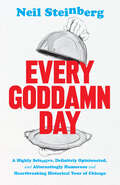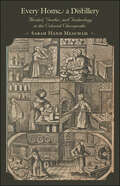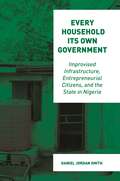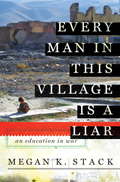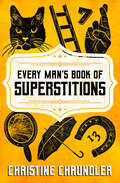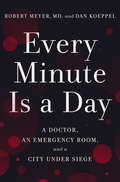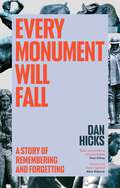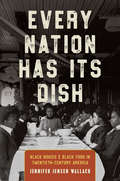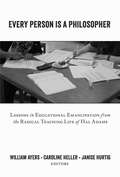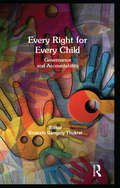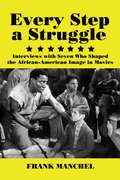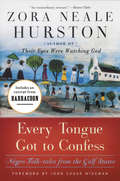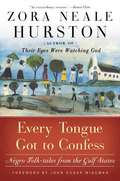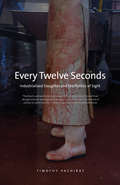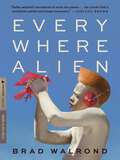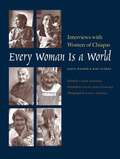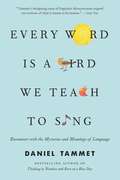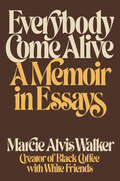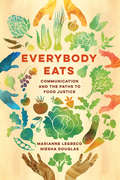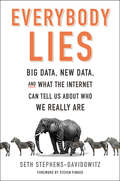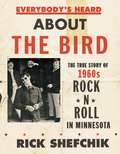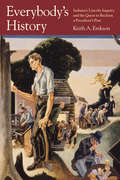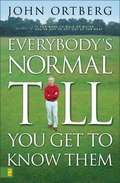- Table View
- List View
Every Goddamn Day: A Highly Selective, Definitely Opinionated, and Alternatingly Humorous and Heartbreaking Historical Tour of Chicago
by Neil SteinbergA daily celebration of Chicago’s history, both known and obscure, and always entertaining. Every day in Chicago is a day to remember. In a city so rich with history, every day is the anniversary of some storied historical or cultural moment, whether it’s the dedication of the Pablo Picasso sculpture downtown on August 15, or the arrest of Rod Blagojevich at his Ravenswood home on December 9, or a fire that possibly involved a cow on October 8. In Every Goddamn Day, acerbic Chicago Sun-Times columnist Neil Steinberg takes the story of the city, pares away the dull, eat-your-peas parts, and provides 366 captivating daily readings in what makes Chicago Chicago and America America. It calls upon a wide cast of characters, from Oscar Wilde to Muhammad Ali, from Emma Goldman to Teddy Roosevelt, and from Richard M. Daley to Fred Hampton, to create a compelling narrative that can be read at a sitting or in a yearlong series of daily doses. From New Year’s Day to New Years’ Eve, Steinberg takes us on a vivid and entertaining tour, illuminating the famous, obscure, tragic, and hilarious elements that make each day in Chicago memorable.
Every Home a Distillery: Alcohol, Gender, and Technology in the Colonial Chesapeake (Early America: History, Context, Culture)
by Sarah H. MeachamIn this original examination of alcohol production in early America, Sarah Hand Meacham uncovers the crucial role women played in cidering and distilling in the colonial Chesapeake. Her fascinating story is one defined by gender, class, technology, and changing patterns of production. Alcohol was essential to colonial life; the region’s water was foul, milk was generally unavailable, and tea and coffee were far too expensive for all but the very wealthy. Colonists used alcohol to drink, in cooking, as a cleaning agent, in beauty products, and as medicine. Meacham finds that the distillation and brewing of alcohol for these purposes traditionally fell to women. Advice and recipes in such guidebooks as The Accomplisht Ladys Delight demonstrate that women were the main producers of alcohol until the middle of the 18th century. Men, mostly small planters, then supplanted women, using new and cheaper technologies to make the region’s cider, ale, and whiskey. Meacham compares alcohol production in the Chesapeake with that in New England, the middle colonies, and Europe, finding the Chesapeake to be far more isolated than even the other American colonies. She explains how home brewers used new technologies, such as small alembic stills and inexpensive cider pressing machines, in their alcoholic enterprises. She links the importation of coffee and tea in America to the temperance movement, showing how the wealthy became concerned with alcohol consumption only after they found something less inebriating to drink. Taking a few pages from contemporary guidebooks, Every Home a Distillery includes samples of historic recipes and instructions on how to make alcoholic beverages. American historians will find this study both enlightening and surprising.
Every Household Its Own Government: Improvised Infrastructure, Entrepreneurial Citizens, and the State in Nigeria
by Daniel Jordan SmithAn up-close account of how Nigerians’ self-reliance in the absence of reliable government services enables official dysfunction to strengthen state powerWhen Nigerians say that every household is its own local government, what they mean is that the politicians and state institutions of Africa’s richest, most populous country cannot be trusted to ensure even the most basic infrastructure needs of their people. Daniel Jordan Smith traces how innovative entrepreneurs and ordinary citizens in Nigeria have forged their own systems in response to these deficiencies, devising creative solutions in the daily struggle to survive.Drawing on his three decades of experience in Nigeria, Smith examines the many ways Nigerians across multiple social strata develop technologies, businesses, social networks, political strategies, cultural repertoires, and everyday routines to cope with the constant failure of government infrastructure. He describes how Nigerians provide for basic needs like water, electricity, transportation, security, communication, and education—and how their inventiveness comes with consequences. On the surface, it may appear that their self-reliance and sheer hustle render the state irrelevant. In reality, the state is not so much absent as complicit. Smith shows how private efforts to address infrastructural shortcomings require regular engagement with government officials, shaping the experience of citizenship and strengthening state power.Every Household Its Own Government reveals how these dealings have contributed to forms and practices of governance that thrive on official dysfunction and perpetuate the very inequalities and injustices that afflict struggling Nigerians.
Every Man in This Village Is a Liar: An Education in War
by Megan StackA shattering account of war and disillusionment from a young woman reporter on the front lines of the war on terror. A few weeks after the planes crashed into the World Trade Center on 9/11, journalist Megan K. Stack, a twenty-five-year-old national correspondent for the Los Angeles Times, was thrust into Afghanistan and Pakistan, dodging gunmen and prodding warlords for information. From there, she traveled to war-ravaged Iraq and Lebanon and other countries scarred by violence, including Israel, Egypt, Libya, and Yemen, witnessing the changes that swept the Muslim world and laboring to tell its stories. Every Man in This Village Is a Liar is Megan K. Stack's riveting account of what she saw in the combat zones and beyond. She relates her initial wild excitement and her slow disillusionment as the cost of violence outweighs the elusive promise of freedom and democracy. She reports from under bombardment in Lebanon; records the raw pain of suicide bombings in Israel and Iraq; and, one by one, marks the deaths and disappearances of those she interviews. Beautiful, savage, and unsettling, Every Man in This Village Is a Liar is a memoir about the wars of the twenty-first century that readers will long remember.
Every Man's Book of Superstitions
by Christine ChaundlerAn enlightening examination of common superstitions and their fascinating origins in history, myth, and ancient religion. Superstitions represent some of humanity&’s earliest attempts to make sense of a dangerous and often incomprehensible world. Even ideas that seem innocuous today, like &“getting up on the wrong side of the bed,&” have their origins in beliefs and practices of vital importance. In Every Man&’s Book of Superstitions, English historian Christine Chaundler explores enduring ideas about luck, magic, astrology, portentous symbols, and more. She also looks at superstitions related to illness, animals, mealtimes, special occasions, specific professions, and so on.
Every Minute Is a Day: A Doctor, an Emergency Room, and a City Under Siege
by Dan Koeppel Robert MeyerAn urgent, on-the-scene account of chaos and compassion on the front lines of ground zero for Covid-19, from a senior doctor at New York City&’s busiest emergency room &“Remarkable and inspiring . . . We&’re lucky to have this vivid firsthand account.&”—A. J. Jacobs, bestselling author of The Year of Living Biblically When former New York Times journalist Dan Koeppel texted his cousin Robert Meyer, a twenty-year veteran of the emergency room at Montefiore Medical Center in the Bronx, at the beginning of the Covid-19 crisis in the United States, he expected to hear that things were hectic. On a scale of 1 to 10, 10 being overwhelmed, where do you think you are? Koeppel asked. Meyer&’s grave reply—100—was merely the cusp of the crisis that would soon touch every part of the globe. In need of an outlet to process the trauma of his working life over the coming months, Meyer continued to update Koeppel with what he&’d seen and whom he&’d treated. The result is an intimate record of historic turmoil and grief from the perspective of a remarkably resilient ER doctor. Every Minute Is a Day takes us into a hospital ravaged by Covid-19 and is filled with the stories of promises made that may be impossible to keep, of life or death choices for patients and their families, and of selflessness on the part of medical professionals who put themselves at incalculable risk. As fast-paced and high-tempo as the ER in which it takes place, Every Minute Is a Day is at its core an incomparable firsthand account of unrelenting compassion, and a reminder that every human life deserves a chance to be saved.
Every Monument Will Fall: A Story of Remembering and Forgetting
by Dan Hicks‘An extraordinary intervention. If you want to understand the stakes and the limitations of contemporary conflict over culture and colonial history this bold, provocative book is an indispensable resource’ Paul Gilroy, founding Director of the Sarah Parker Remond Centre for the Study of Race and Racism at UCL‘Hicks’ must-read book describes how it was possible for a human skull to be made into a drinking cup and used in a genteel Oxford college, well into the 21st century, as if empire were an eternal state of nature . . . Read it to learn new ways to be anti-racist, abolitionist and to tell other stories than those commemorated by the monuments that surround us, from statues, to museums and the police’ Nicholas Mirzoeff, author of White Sight‘Brave and clear-sighted. Hicks opens up an extraordinary conversation between the past and the present. This is a book about falling statues, but so much more. It’s about how we’ve been lied to, and how we can approach the past with honesty. Hicks asks whether history and archaeology should be used to justify actions we know impinge on the rights of others - or to understand ourselves better’ Alice Roberts, bestselling author of Crypt ‘Dan Hicks writes with grace and fierce focus about what we choose to remember and why, in our patterns of thought, our institutions and the built environment in which we live’ Eyal Weizman, director of Forensic ArchitectureThe culture war is over. If you want it to be. It wasn’t even a culture war; it was a war on culture. A sustained attack, Dan Hicks argues, in the form of the weaponisation of civic museums, public art, and even universities — and one that has a deeper history than you might think.Tracing the origins of contemporary conflicts over art, heritage, memory, and colonialism, Every Monument Will Fall joins the dots between the building of statues, the founding of academic disciplines like archaeology and anthropology, and the warehousing of stolen art and human skulls in museums — including the one in which he is a curator.Part history, part biography, part excavation, the story runs from the Yorkshire wolds to the Crimean War, from southern Ireland to the frontline of the American Civil War, from the City of London to the University of Oxford — revealing enduring legacies of militarism, slavery, racism and white supremacy hardwired into the heart of our cultural institutions.Every Monument Will Fall offers an urgent reappraisal of how we think about culture, and how to find hope, remembrance and reconciliation in the fragments of an unfinished violent past. Refusing to choose between pulling down every statue, or living in a past that we can never change, the book makes the case for allowing monuments to fall once in a while, even those that are hard to see as monuments, rebuilding a memory culture that is in step with our times.
Every Mother's Son: The Role of Mothers in the Making of Men
by Judith ArcanaIs it possible for us to bring up boys in a non-sexist way? That's the question at the core of this groundbreaking book. During the first ten years of her son Daniel's life, Judith Arcana kept a journal in which she recorded her experiences as a mother -- specifically as a mother of a boy. Drawing from her journal and from interviews with sixty mothers and sons, Arcana presents a compelling examination of male socialization and the role of women in raising sons.
Every Nation Has Its Dish: Black Bodies and Black Food in Twentieth-Century America
by Jennifer Jensen WallachJennifer Jensen Wallach's nuanced history of black foodways across the twentieth century challenges traditional narratives of "soul food" as a singular style of historical African American cuisine. Wallach investigates the experiences and diverse convictions of several generations of African American activists, ranging from Booker T. Washington and W. E. B. Du Bois to Mary Church Terrell, Elijah Muhammad, and Dick Gregory. While differing widely in their approaches to diet and eating, they uniformly made the cultivation of "proper" food habits a significant dimension of their work and their conceptions of racial and national belonging. Tracing their quests for literal sustenance brings together the race, food, and intellectual histories of America.Directly linking black political activism to both material and philosophical practices around food, Wallach frames black identity as a bodily practice, something that conscientious eaters not only thought about but also did through rituals and performances of food preparation, consumption, and digestion. The process of choosing what and how to eat, Wallach argues, played a crucial role in the project of finding one's place as an individual, as an African American, and as a citizen.
Every Person Is A Philosopher: Lessons In Educational Emancipation From The Radical Teaching Life Of Hal Adams (Teaching Contemporary Scholars)
by Bill Ayers William Ayers Caroline Heller Janise HurtigHal Adams was a legendary radical educator who organized writing workshops with people who had been written off during much of their lives, marginalized for reasons of race, gender, class, and caste. Hal detested the carelessness and neglect his students endured and set about building spaces of respect and reparation. Fostering communities of local writers and publishing their work in journals of «ordinary thought, » the work brought pride and dignity to the authors, carrying the wisdom of their narratives into and beyond their communities. In the traditions of Paulo Freire, Antonio Gramsci, and C.L.R. James, Hal based his approach on the conviction that every person is a philosopher, artist, and storyteller, and that only the insights and imaginings of the oppressed can sow seeds of authentic social change. Every Person Is a Philosopher gathers essays by classroom and community educators deeply influenced by Hal's educational work and vision, and several essays by Hal Adams. They explore diverse ways this humanizing pedagogy can be applied in a wide range of contexts, and consider its potential to transform students and teachers alike. This is an ideal text for courses in educational foundations, multicultural education, urban studies, sociology of education, English education, social justice education, literacy education, socio-cultural contexts of teaching, adult education, cultural studies, schools and communities, and popular education.
Every Right for Every Child: Governance and Accountability
by Enakshi Ganguly ThukralDespite some acknowledgement over the years of the significance of seeing children as rights holders, children’s concerns continue to run the risk of not being considered political and mainstream: they continue to be viewed as extensions of adults or simply as members of families and communities. This when the reality is that children are citizens the minute they are born, and entitled to as much attention, if not more than adults, given their age and vulnerability. Concerned with the mainstreaming of children’s interests in policy-making, this book raises such questions as: What is good governance vis-à-vis children? What are the standards and indicators? Can there be one answer for this question that is applicable to all countries? In order to arrive at a better understanding of what good governance for children means and how the realization of the political, cultural, social and civil rights of children may be achieved, the book draws on the diverse and yet comprehensive body of knowledge that has developed over the years from initiatives taken by organisations across the world who work with policy makers to make governance systems more accountable and responsive to the well-being of children as citizens in themselves, simultaneously empowering children to take part in decision-making processes that impact their lives.
Every Step a Struggle: Interviews with Seven Who Shaped the African-American Image in Movies
by Frank Manchel“This fascinating collection of interviews is ‘must reading’ for anyone interested in the cultural politics of race in America. A unique historical resource.” —Denise Youngblood, author of Cinematic Cold WarThis book pays tribute to the sacrifices and achievements of seven individuals who made difficult and controversial choices to ensure that black Americans shared in the evolution of the nation’s cultural heritage. Transcriptions and analyses of never-before-published uncensored conversations with Lorenzo Tucker, Lillian Gish, King Vidor, Clarence Muse, Woody Strode, Charles Gordone, and Frederick Douglass O’Neal reveal many of the reasons and rationalizations behind a racist screen imagery in the first three-quarters of the twentieth century. This primary source, replete with pictures, documentation, and extensive annotations, recounts through the words of important participants what happened to many film pioneers when a new generation of African-Americans rebelled against the nation’s stereotyped film imagery. “The author has taken a unique approach and may have even created a new genre of writing: theinterview embellished with scholarly commentary. It is a fascinating experiment . . . This book belongs in every research library and in all public libraries from mid-size to large cities. It fills in lacunae between existing studies.” —Peter C. Rollins, Emeritus Editor-in-Chief of Film & History
Every Tongue Got to Confess
by Zora Neale HurstonEvery Tongue Got to Confess is an extensive volume of African American folklore that Zora Neale Hurston collected on her travels through the Gulf States in the late 1920s.The bittersweet and often hilarious tales -- which range from longer narratives about God, the Devil, white folk, and mistaken identity to witty one-liners -- reveal attitudes about faith, love, family, slavery, race, and community. Together, this collection of nearly 500 folktales weaves a vibrant tapestry that celebrates African American life in the rural South and represents a major part of Zora Neale Hurston's literary legacy.
Every Tongue Got to Confess: Negro Folk-Tales from the Gulf States
by Zora Neale HurstonOver 400 folktales collected by Hurston during the 1920s. Stories cover a variety of themes and highlight the importance of the African American oral tradition.
Every Twelve Seconds: Industrialized Slaughter and the Politics of Sight (Yale Agrarian Studies Series)
by Timothy PachiratThis is an account of industrialized killing from a participant’s point of view. The author, political scientist Timothy Pachirat, was employed undercover for five months in a Great Plains slaughterhouse where 2,500 cattle were killed per day—one every twelve seconds. Working in the cooler as a liver hanger, in the chutes as a cattle driver, and on the kill floor as a food-safety quality-control worker, Pachirat experienced firsthand the realities of the work of killing in modern society. He uses those experiences to explore not only the slaughter industry but also how, as a society, we facilitate violent labor and hide away that which is too repugnant to contemplate.Through his vivid narrative and ethnographic approach, Pachirat brings to life massive, routine killing from the perspective of those who take part in it. He shows how surveillance and sequestration operate within the slaughterhouse and in its interactions with the community at large. He also considers how society is organized to distance and hide uncomfortable realities from view. With much to say about issues ranging from the sociology of violence and modern food production to animal rights and welfare, Every Twelve Seconds is an important and disturbing work.
Every Where Alien
by Brad Walrond“Every Where Alien is a book that asks for interaction and understanding. . . . Brad Walrond defies aesthetic boundaries to write the poems that only he could write, poems that travel time and space for a truth that is sometimes painful and always necessary.”—Jericho Brown, Pulitzer Prize-winning author of The TraditionIn this dazzling collection, the poet, author, and conceptual/performance artist traces blackness, queerness, and desire through the legacy of 1990s and early 2000s New York City underground art movements, illuminating how their roots and undertold histories inspire today’s culture.Every Where Alien is Brad Walrond’s dazzling afro-futuristic, afro-surrealist journey through New York City’s underground art movements, including the New Black Arts Movement, Black Rock Coalition, the Underground House Music-Dance community, the HIV/AIDS Black Queer Artivists, and the House Ballroom Scene.Every Where Alien catapults us to New York City mid-1990s, early-2000s to rebroadcast the black queer creative genius of marginalized communities. Walrond questions narrow conceptions of “alien” as outsider, to explore how feelings of alienation also call us toward our shared humanity. In holographic odes, he pays homage to creative forces both living and dead. Giants like James Baldwin, Nina Simone, Octavia Butler, Ntozake Shange, Amiri Baraka, belong to the same space-time as Larry Levan, Erykah Badu, Vernon Reid, Yasiin Bey, Greg Tate. Here Patti Smith, Kendrick Lamar, Kalief Browder, Willi Ninja, Jeff Mills, Sarah Jones, share the same air. Featuring gorgeous, black-and-white illustrations, Every Where Alien traces our common and conflicting identities to vindicate why human beings are always greater than the sums of our parts. Walrond is a rebellious virtuoso wielding empathy, grief, anger, and grit in equal measure. This triumphant collection is a passionate reminder that through our dreams and determination, we create our own utopias.
Every Woman Is a World
by Gayle WalkerBorn in the remote mountains and tropical forests of southern Mexico, the elder women of Chiapas have witnessed tumultuous change during their lifetimes, which in some cases spanned the entire twentieth century. Through hard experience, these women have gained unique perspectives on the transformations that modernity has brought to their traditional way of life. Reflecting on this rich store of wisdom, artists Gayle Walker and Kiki Suárez began interviewing and photographing Chiapanec women between the ages of 60 and 108. In this book, they present the life stories of twenty-eight women, who speak for the silent members of a divided society - well-to-do, urban ladinas of European descent; mixed race, low-income mestizas; and indigenous Maya from the highlands and Lacandon rainforest. As the women tell their stories, they shed light on major historical events as well as the personal dramas of daily life. For some, the Mexican Revolution and the 1918 Spanish influenza epidemic are still painfully vivid. Others focus on recent social upheavals, such as the 1994 Zapatista Uprising. Women whose families had more resources fondly recall their high school days, while poorer women tell tragic stories of deprivation, hunger, and family violence. Particularly thought-provoking are the women's attitudes toward marriage, work, religion, and their own mortality. Considering the limited opportunities these women faced, Walker and Suárez sum up the significant theme of these interviews by observing that the women of Chiapas "remind us that if we are flexible, creative, and courageous, we have many more possibilities than we think we have. "
Every Word Is a Bird We Teach to Sing: Encounters with the Mysteries and Meanings of Language
by Daniel TammetA mind-expanding, deeply humane tour of language by the bestselling author of Born on a Blue Day and Thinking in Numbers.Is vocabulary destiny? Why do clocks "talk" to the Nahua people of Mexico? Will A.I. researchers ever produce true human-machine dialogue? In this mesmerizing collection of essays, Daniel Tammet answers these and many other questions about the intricacy and profound power of language. In Every Word Is a Bird We Teach to Sing, Tammet goes back in time to London to explore the numeric language of his autistic childhood; in Iceland, he learns why the name Blær became a court case; in Canada, he meets one of the world's most accomplished lip readers. He chats with chatbots; contrives an "e"-less essay on lipograms; studies the grammar of the telephone; contemplates the significance of disappearing dialects; and corresponds with native Esperanto speakers - in their mother tongue. A joyous romp through the world of words, letters, stories, and meanings, Every Word Is a Bird We Teach to Sing explores the way communication shapes reality. From the art of translation to the lyricism of sign language, these essays display the stunning range of Tammet's literary and polyglot talents.
Everybody Come Alive: A Memoir in Essays
by Marcie Alvis WalkerA dazzling memoir that explores what it means to become fully alive and holy when we embrace the silenced stories we&’ve inherited—from the creator of Black Coffee with White Friends.&“Marcie Alvis Walker writes with an honesty that is both dauntless and compassionate.&”—Cole Arthur Riley, author of This Here FleshIn her debut book, Everybody Come Alive, Marcie Alvis Walker invites readers into a deeply intimate and illuminating memoir comprising lyrical essays and remembrances of being a curious child of the seventies and eighties, raised under the critical and watchful eye of Jim Crow matriarchs who struggled to integrate their lives and remain whole.While swimming in rivers of racial trauma and racial reckoning, Alvis Walker explores her earliest memories—of abandonment and erasure, of her mother&’s mental illness and incarceration, and of her ongoing struggles with perfectionism and body dysmorphia—in hopes of leaving a healed and whole legacy for her own child. Nostalgic but unflinching, candid yet tender, Everybody Come Alive is an invitation to be vulnerable along with the author as she unravels all the beauty and terror of God, race, and gender&’s imprint on her life.This is a coming-of-age journey touching on the bittersweet pain and joy of what it takes to become a person who embraces being Black, a woman, and holy in America. Alvis Walker&’s unforgettable writing challenges readers to not only see and hold her story as being fully human, but also to see and hold their own stories too.
Everybody Eats: Communication and the Paths to Food Justice (Communication for Social Justice Activism #3)
by Marianne LeGreco Niesha DouglasEverybody Eats tells the story of food justice in Greensboro, North Carolina—a midsize city in the southern United States. The city's residents found themselves in the middle of conversations about food insecurity and justice when they reached the top of the Food Research and Action Center's list of major cities experiencing food hardship. Greensboro's local food communities chose to confront these high rates of food insecurity by engaging neighborhood voices, mobilizing creative resources at the community level, and sustaining conversations across the local food system. Within three years of reaching the peak of FRAC's list, Greensboro saw an 8 percent drop in its food hardship rate and moved from first to fourteenth in FRAC's list. Using eight case studies of food justice activism, from urban farms to mobile farmers markets, shared kitchens to food policy councils, Everybody Eats highlights the importance of communication—and communicating social justice specifically—in building the kinds of infrastructure needed to create secure and just food systems.
Everybody Lies: Big Data, New Data, and What the Internet Can Tell Us About Who We Really Are
by Seth Stephens-DavidowitzForeword by Steven PinkerBlending the informed analysis of The Signal and the Noise with the instructive iconoclasm of Think Like a Freak, a fascinating, illuminating, and witty look at what the vast amounts of information now instantly available to us reveals about ourselves and our world—provided we ask the right questions.By the end of on average day in the early twenty-first century, human beings searching the internet will amass eight trillion gigabytes of data. This staggering amount of information—unprecedented in history—can tell us a great deal about who we are—the fears, desires, and behaviors that drive us, and the conscious and unconscious decisions we make. From the profound to the mundane, we can gain astonishing knowledge about the human psyche that less than twenty years ago, seemed unfathomable. Everybody Lies offers fascinating, surprising, and sometimes laugh-out-loud insights into everything from economics to ethics to sports to race to sex, gender and more, all drawn from the world of big data. What percentage of white voters didn’t vote for Barack Obama because he’s black? Does where you go to school effect how successful you are in life? Do parents secretly favor boy children over girls? Do violent films affect the crime rate? Can you beat the stock market? How regularly do we lie about our sex lives and who’s more self-conscious about sex, men or women? Investigating these questions and a host of others, Seth Stephens-Davidowitz offers revelations that can help us understand ourselves and our lives better. Drawing on studies and experiments on how we really live and think, he demonstrates in fascinating and often funny ways the extent to which all the world is indeed a lab. With conclusions ranging from strange-but-true to thought-provoking to disturbing, he explores the power of this digital truth serum and its deeper potential—revealing biases deeply embedded within us, information we can use to change our culture, and the questions we’re afraid to ask that might be essential to our health—both emotional and physical. All of us are touched by big data everyday, and its influence is multiplying. Everybody Lies challenges us to think differently about how we see it and the world.
Everybody was Kung-fu Dancing: Chronicles of the Lionized and the Notorious
by Chet FlippoA collection of magazine articles, many from the Rolling Stone, by the American music journalist and biographer Chet Flippo, mostly from the 1980s. People covered or interviewed include: John Lennon, Al Green, Tony Bennett, Les Paul, Chet Atkins, Bobby Bare, Bill Haley, Phil Ochs, David Geffen, Jimmy Buffett, Elvis, Mick Jagger,, Willie Nelson, Waylon Jennings.
Everybody's Heard about the Bird: The True Story of 1960s Rock 'n' Roll in Minnesota
by Rick ShefchikIf you didn&’t experience rock and roll in Minnesota in the 1960s, this book will make you wish you had. This behind-the-scenes, up-close-and-personal account relates how a handful of Minnesota rock bands erupted out of a small Midwest market and made it big. It was a brief, heady moment for the musicians who found themselves on a national stage, enjoying a level of success most bands only dream of.In Everybody&’s Heard about the Bird, Rick Shefchik writes of that time in vivid detail. Interviews with many of the key musicians, combined with extensive research and a phenomenal cache of rare photographs, reveal how this monumental era of Minnesota rock music evolved. The chronicle begins with musicians from the 1950s and early 1960s, including Augie Garcia, Bobby Vee, the Fendermen, and Mike Waggoner and the Bops. Shefchik looks at how a local recording studio and record label, along with Minnesota radio stations, helped make their achievements possible and prepared the way for later bands to break out nationally. Shefchik delves deeply into the Trashmen&’s emblematic rise to fame. A Minneapolis band that recorded a fluke novelty hit called &“Surfin&’ Bird&” at Kay Bank Studios, the Trashmen signed with Soma Records, topped the local charts in late 1963, and were poised to top the national charts in early 1964. Hundreds of Minnesota bands took inspiration from the Trashmen&’s success, as teen dances with live bands flourished in clubs, ballrooms, gyms, and halls across the Upper Midwest. Here are the stories of bands like the Gestures, the Castaways, and the Underbeats, and the triumphs—and tragedies—of the most prominent Minnesota-spawned bands of the late 1960s, including Gypsy, Crow, and the Litter.For the baby boomers who remember it and everyone else who has felt its influence, the 1960s rock-and-roll scene in Minnesota was an extraordinary period both in musical history and popular culture, and now it&’s captured fully in print for the first time. Everybody&’s Heard about the Bird celebrates how these bands found their singular sound and played for their elated audiences from the golden era to today.
Everybody's History: Indiana's Lincoln Inquiry and the Quest to Reclaim a President's Past
by Keith A. EreksonRevered by the public, respected by scholars, and imitated by politicians, Abraham Lincoln remains influential more than two hundred years after his birth. His memory has inspired books, monuments, and museums and also sparked controversies, rivalries, and forgeries. That so many people have been interested in Lincoln for so long makes him an ideal subject for exploring why history matters to ordinary Americans as well as to academic specialists. In Everybody's History, Keith A. Erekson focuses on the Southwestern Indiana Historical Society--an organization composed of lawyers, historians, collectors, genealogists, teachers, college presidents, and newspaper editors--who joined together during the 1920s and 1930s to recover a part of Lincoln's life his biographers had long ignored: the years from age seven to twenty-one when he lived on the Indiana frontier. Participants in the "Lincoln Inquiry," as it was commonly known, researched old records, interviewed aging witnesses, hosted pageants, built a historical village, and presented their findings in public and in print. Along the way they defended their methods and findings against competitors in the fields of public history and civic commemoration, and rescued some of Indiana's own history by correcting a forgotten chapter of Lincoln's. Everybody's History traces the development of popular interest in Lincoln to uncover the story of an extensive network of nonprofessional historians who contested old authorities and advanced new interpretations. In so doing, the book invites all who are interested in the past to see history as both vital to public life and meaningful to everybody.
Everybody's Normal Till You Get to Know Them
by John Ortberg-- The need for community is woven into the very fabric of our being. Nothing else can substitute for the life-giving benefits of connecting with others--not even God. He won't preempt the way he himself has designed us to reflect his own intensely relational nature. But there's a hitch in our experience of community, says John Ortberg: We're all weird. Folks around us may seem normal enough, but just wait till we get to know them--and they get to know us. The unhealthy, sinful ways we respond to life in a fallen world are hardly God's idea of "normal," and they can make us as unhuggable as porcupines. We face the "porcupine dilemma," says Ortberg: We need each other, but how do we get close without getting hurt? How do we get past all those quills and grow together in Christ? In Everybody's Normal Till You Get to Know Them, Ortberg once again reveals his gift for sharing profound insights using a lighten-up approach. With winsome humor and a fondness for well-spun stories, he pops the myth of normalcy and hands us the keys to creating and sustaining relationships. "God's dream for community encompasses the redemption of all spheres of life," he says. Who doesn't want to be liked, to be wanted, to have solid, satisfying friendships? Ortberg shows what such relationships are made of. He reveals the benefits of authenticity--what it means to live with an "unveiled face," as the Bible puts it. He encourages us to trade the stones it's so easy to cast at others for acceptance. He opens our eyes and hearts to empathy, the art of reading people. And he takes us through the ins and outs of conflict, forgiveness, confrontation, inclusion, and gratitude. The principles and discussion questions in this book are down-to-earth. They're for real people living in a real world, and are intended to help us count the practical cost of relationship and then pay it--because in all the rewards and struggles of community, we're investing in something beyond our comprehension. You could call it heaven. You could call it home. It's the place where all of us are headed, all of us belong, and all of us will be normal at last. "
